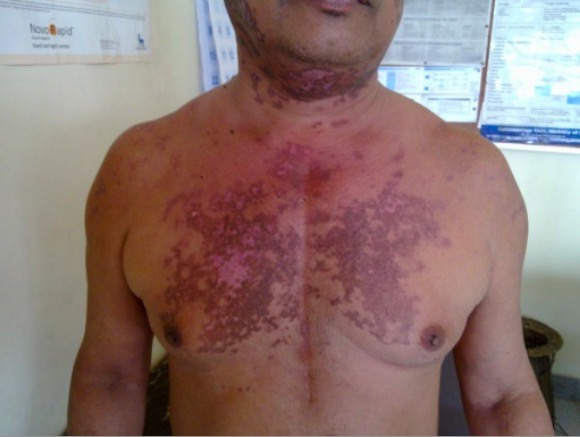Playlist
Show Playlist
Hide Playlist
Systemic Lupus Erythematosus (SLE): Complications and Management
-
Slides SLE.pdf
-
Reference List Rheumatology.pdf
-
Download Lecture Overview
00:01 There are a lot of complications associated with lupus which you'll cover in more detail in some other lectures but they're definitely at least worth mentioning here. 00:09 This list here, while extensive, is actually an abbreviated list. As I said, lupus can affect everything. Let's start with APLS. 00:17 So, APLS is a systemic autoimmune disorder characterized by venous and arterial thromboses and it's due to these pathologic, antiphospholipid antibodies. 00:28 It's most often seen with lupus though it can occur in isolation as well. 00:32 Oftentimes, it's detected in women who report multiple pregnancy loses. 00:36 Next stop is neonatal lupus. 00:39 This is an autotimmune illness that newborns experience due to the passive transfer of those auto-antibodies that lupus patients have from the mother to the fetus. It's most common manifesting with heart block in neonates. 00:51 Raynaud's disease. So, Raynaud's phenomenon is a pathologic vasoconstriction of the fingers and toes with different coloration that we might see and it's often in response to cold. It can be either primary or secondary to some other autoimmune disease. 01:05 Typically you'll see intermittently achiral pallor followed by cyanosis and then erythrodermic kind of presentation. 01:12 We often treat it with calcium channel blockers though there are some other more aggressive treatments that are available as well. 01:18 Vasculitis. There's a lot of different vasculitides out there. 01:21 Lupus is one of the causes of vasculitis that would be considered a secondary vasculitis. 01:26 It's usually a cutaneous small vessel vasculitis with palpable purpura. You're likely to find a leukocytoclastic vasculutis on biopsy and there's a variety of different possible presentations of that as well. 01:38 Interstitial lung disease. In addition to the serositis that patients with lupus get, they are definitely at risk for interstitial lung disease. 01:46 Though perhaps, not to the same extent of folks with rheumatoid arthritis might be. 01:50 Next stop, verrucous endocarditis, so-called Libman-Sacks. 01:55 This is a sterile type of endocarditis in contrast to spontaneous bacterial endocarditis but it can lead to the same down street complications; embolic strokes and other embolic events. 02:05 Lupus is a systemic disease an inflammatory disease and so just like in rheumatoid arthritis and other chronic autoimmune conditions, patients are at increased risk of atherosclerotic disease and that's where you have to be particularly careful about monitoring their cardiovascular risk. 02:21 Secondary Sjogren's, again, this is just part of the idea of their being overlapped syndromes and mixed connective tissue disease. 02:29 Patients are susceptible to developing other autoimmune conditions including Sjogren's. 02:33 And lastly, retinal vasculopathy is one of the last manifestations on our extensive list. 02:39 Lupus nephritis really deserves its own list because it is so common in lupus and also has such significant morbidity associated with it. 02:48 So, there are some specific features associated with lupus nephritis. 02:51 You're gonna see hematuria, red blood cell casts, and proteinuria on your urinalysis and you also may find as I suggested before, low compliment levels which predict disease course for lupus nephritis. 03:03 Anti-double stranded DNA antibodies may also be suggestive that the lupus nephritis is present. 03:08 On biopsy, you'll find IgG immune complex deposition in the mesangium, in the sub-endothelial and the subepithelial spaces. 03:16 Here on the right side here, we have a picture of a normal glomerulus on the left and a diffuse proliferative glomerulonephritis of lupus shown on the right. 03:24 The biopsy importantly, is not just for diagnostic purposes but it can actually help to guide treatment. 03:31 If you're seeing focal versus diffused proliferative glomerulonephritis, that may steer you to towards just using an ACE inhibitor or maybe steroids versus adding on cytoxan or mycophenolate mofetil. 03:42 Alright, so let's give an overview of the management of lupus acknowledging that all of those different complications of lupus may have their own individual treatments. 03:51 On the whole, you should recommend to your patients that they avoid the sun. 03:55 Sun exposure does not just precipitate photosensivity but it actually may exacerbate all of the different manifestations of lupus. 04:02 For discomfort and also to calm down the disease, you can just use NSAIDs. 04:08 Most patients end up also on hydroxychloroquine. 04:11 Glucocorticoids are very useful to cool down acute presentations or acute flares of lupus and then a lot of patients end up on azathioprine, methotrexate, cyclophosphamide, mycophenalate mofetil for controling the disease over the long term. 04:25 There are a host of different treatment complications that you can imagine from the different medications we're talking about here. 04:31 No prolonged glucocorticoid use in its own right can contribute to immune suppression, bone disease, etc. 04:37 So it's important to be mindful of those downstream complications in the long term management of patients with lupus, particularly when the disease is made at a relatively young age. 04:47 So, let's highlight a few key points about SLE. 04:51 First, it is a chronic inflammatory disease of unknown cause affecting virtually every organ. 04:59 It's diagnosed by using those criteria we alluded to before for 4-skin-RASHNIA and a patient has lupus if they meet any four of those 11 criteria. 05:08 The anti-double stranded DNA and anti-Smith antibodies are particularly specific for this condition and you can also look for hypocomplementemia. 05:17 The mortality from lupus is most often due to renal disease and certainly that contributes to the end stage renal disease. 05:23 Infections are also a significant problem and cardiovascular disease for long-term patients. 05:29 Finally, you're probably gonna end up using the non-biologic disease-modifying anti-rheumatic drugs to control this disease.
About the Lecture
The lecture Systemic Lupus Erythematosus (SLE): Complications and Management by Stephen Holt, MD, MS is from the course Connective Tissue Diseases.
Included Quiz Questions
Antiphospholipid antibodies are most commonly associated with which one of the following conditions?
- Systemic lupus erythromatosus
- HIV infection
- Syphilis
- Hepatitis C infection
- Antiepileptic drugs
What is considered the first-line treatment for Raynaud syndrome?
- Calcium-channel blockers
- Phosphodiesterase type 5 inhibitors
- Topical nitrates
- Angiotensin II receptor blockers
- Selective serotonin reuptake inhibitors
Which of the following is NOT a typical feature of lupus nephritis?
- Muddy brown casts
- Red blood cell casts
- Proteinuria
- Low complement levels
- IgG immune complex deposition
Customer reviews
5,0 of 5 stars
| 5 Stars |
|
1 |
| 4 Stars |
|
0 |
| 3 Stars |
|
0 |
| 2 Stars |
|
0 |
| 1 Star |
|
0 |
Clear and conclusive, include all high-yield information needed for test




